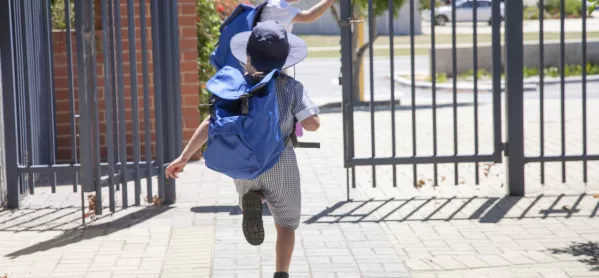- Home
- Why don’t schools make more of pick-up time?
Why don’t schools make more of pick-up time?

Until recently every afternoon in term time over 2 million people turned up at school entrances to pick up children and take them home.
This is an estimate based on the fact there are over 5 million children at nursery and primary schools in the UK, and many of those collecting children will be responsible for more than one child, and a few children will go home on their own.
Of course, at the present time Covid-19 has drastically reduced the numbers of children who have to be collected from school each day.
Some parents may be missing the contacts with teachers and the friendly chats around the school gates.
However, others will be glad to be free from the difficulties that can be involved in collecting the children every day.
The school pick-up: how to make parents feel welcome
Despite the huge role that it plays in the day-to-day life of schools, end-of-school collection is an area that has been largely ignored by educationalists, even though it is a universal aspect of schooling.
With three children and eight grandchildren, I calculate I have collected children from over 25 educational establishments. What have I learned from this experience?
Some schools expect parents to stand in the street, perhaps on a narrow pavement with traffic thundering past.
Some welcome them in, perhaps only as far as the playground, but maybe to the classroom, where a brief chat with a teacher can sort out a problem or provide a useful understanding of the child’s homework or latest project.
Some provide seats and shelter for wet days. Others do not.
Some schools recognise that primary parents may well be accompanied by younger children and allow them access to the playground for their safety and enjoyment.
Other schools expect collectors to keep their toddlers safe on narrow pavements, among the fumes from passing cars, and sometimes in pouring rain.
Some headteachers hide in their offices while others take this as an opportunity to greet parents.
If parents are late, some schools make careful arrangements for the continuing care of the children, while others adopt a careless or even a punitive approach.
Many schools do not have the ability to provide parking, leading to busy streets, congested pavements and irate parents.
The “Walking Bus” is an important innovation to counter this but does not meet all needs.
Grandparents ‘squatting on doorsteps’
The worst school I have ever collected from was probably a fee-paying school in Hampstead, North London, where children were released on to a narrow pavement, and where tired parents and grandparents squatted on neighbouring doorsteps.
There was no provision for wet days and collectors were not welcome inside the school.
The best was a state school just two miles away in Camden.
Here the playground had seats and a shelter for wet days and there was plenty of play equipment to keep the pre-school children happy while they waited.
Children could be picked up from their classrooms, the headteacher was often around and there was no pressure to leave.
On summer afternoons many parents and children lingered in the school playground for half an hour or more, sharing food, chatting and watching the children play.
This was a wonderful way to make those who were coming up to school age feel at home before they even started school.
It was no accident that this school was particularly well-loved and well supported by its local community.
Building better links with parents
What you may notice here is that many of the things that might improve the experience of collecting children from school do not cost much money or involve teachers in more work.
Opening the gates early or allowing pre-school children to enjoy play equipment costs nothing, beyond telling parents they are responsible for those children’s safety.
Seats might be provided by the PTA, while a shelter in the playground will also benefit the school-age children.
What happens during this part of the school day is very relevant to those debates about parental engagement and a rare example when it is all largely within the control of the school.
Do teachers ever discuss the experience of those who collect the children? Do school meetings debate what might be done to improve matters?
At a time when Covid-19 has stimulated many schools to rethink their relationships with parents, perhaps this part of the school day should also come under scrutiny.
Now, of course, we need to consider how social distancing should operate at the school gates.
When life eventually gets back to normal, though, better management of the collecting experience could benefit not only parents and children but also schools and their relationship with parents and with the wider community.
Jan Pahl is professor emeritus of social policy at the University of Kent. Her research has focused on issues related to the family and health and welfare
Keep reading for just £1 per month
You've reached your limit of free articles this month. Subscribe for £1 per month for three months and get:
- Unlimited access to all Tes magazine content
- Exclusive subscriber-only stories
- Award-winning email newsletters